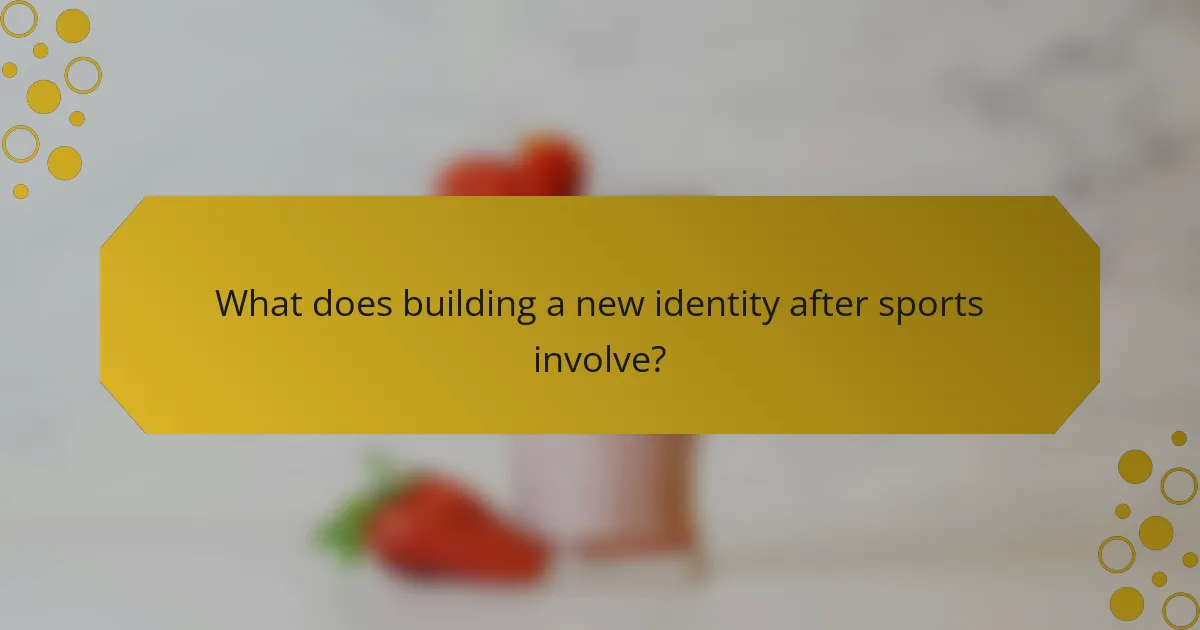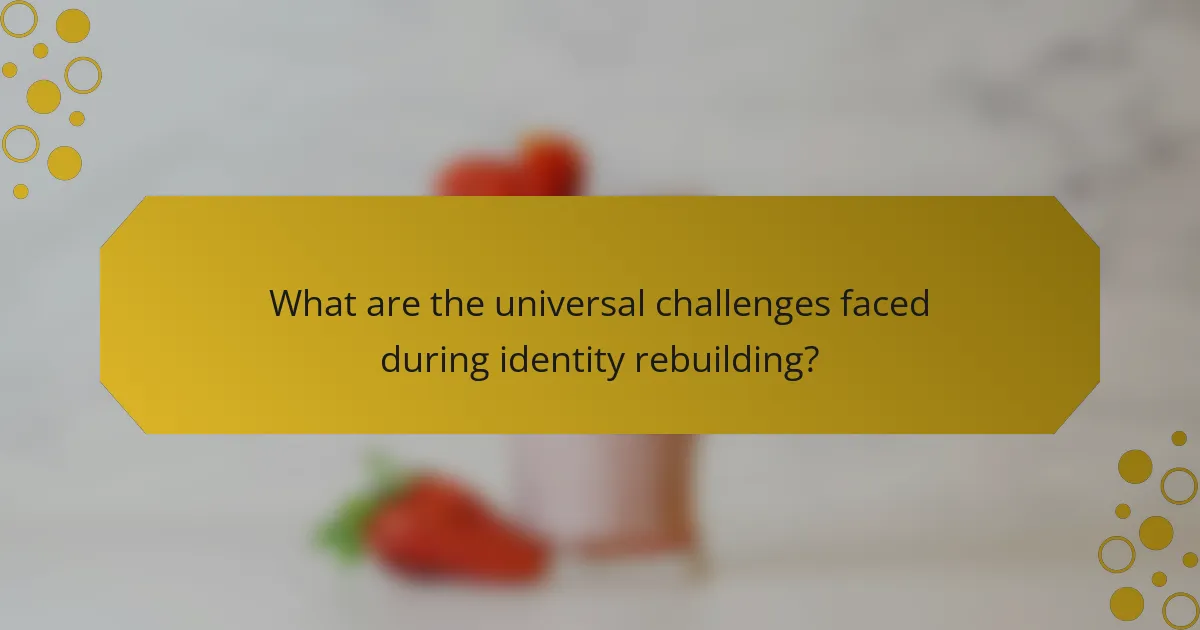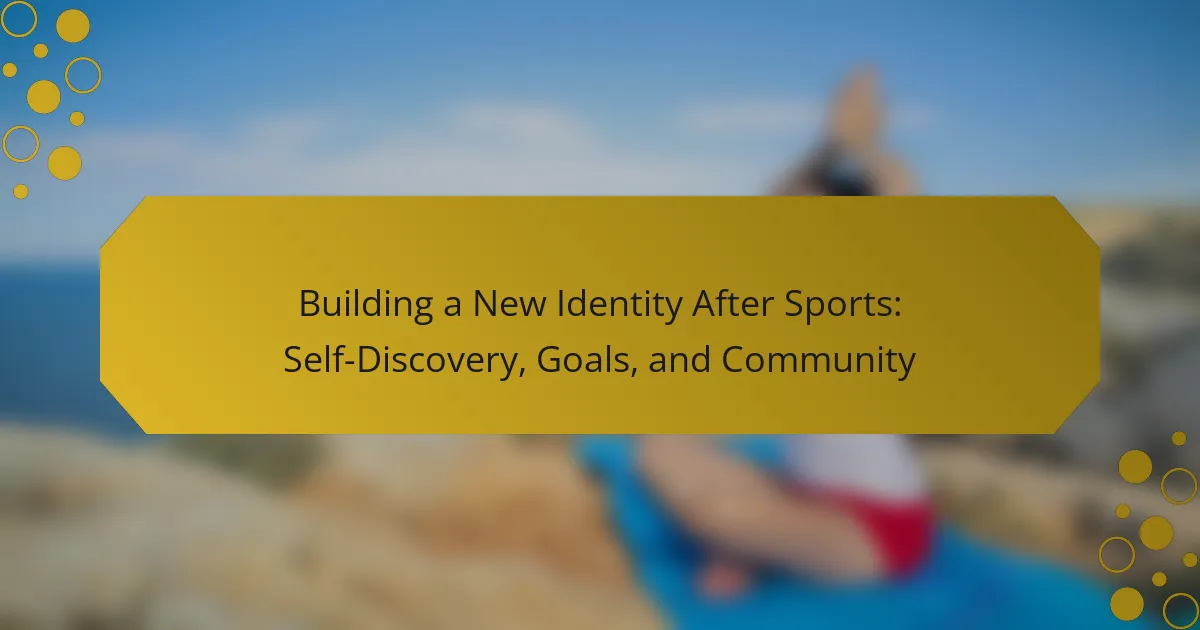Transitioning to a new identity after sports can be challenging, as athletes often face loss of purpose and isolation. This journey involves self-discovery to explore new interests, setting achievable goals for direction, and engaging with supportive communities. Personal resilience and adaptability are key traits that can enhance this transformation, fostering connections that provide motivation and belonging. Embracing these elements can lead to a fulfilling life beyond competitive athletics.

What does building a new identity after sports involve?
Building a new identity after sports involves self-discovery, setting new goals, and engaging with community support. Athletes often face challenges in redefining their purpose post-career. Self-discovery includes exploring interests beyond sports, which can lead to unique opportunities. Setting new goals helps create a sense of direction and fulfillment. Community support plays a crucial role in this transition, offering connection and shared experiences. Engaging with others who understand the journey can enhance resilience and provide motivation.
How does self-discovery play a role in this transition?
Self-discovery is crucial during the transition from sports to a new identity. It helps individuals understand their strengths, values, and passions beyond athletics. This process fosters personal growth and clarifies new goals, enabling a smoother adaptation to life after sports. Engaging with community support during self-discovery enhances motivation and provides diverse perspectives, making the transition more enriching.
What are the stages of self-discovery after sports?
The stages of self-discovery after sports typically include reflection, exploration, goal-setting, and community engagement.
Reflection involves assessing past experiences and identifying personal values. Exploration allows individuals to discover new interests and passions outside of sports. Goal-setting focuses on establishing new objectives that align with one’s identity post-sports. Community engagement fosters connections with others, providing support and shared experiences.
How can athletes identify their core values post-career?
Athletes can identify their core values post-career by reflecting on their experiences and passions. This process involves self-assessment, engaging with mentors, and exploring new interests. Athletes should consider their motivations, strengths, and the impact they wish to have in their communities. Setting new personal and professional goals can further clarify these values, fostering a sense of purpose beyond sports.
What goals should be set during this identity transition?
During this identity transition, set goals focused on self-exploration, skill development, and community engagement. Establish clear objectives that reflect personal values and interests, such as pursuing new hobbies or building relationships. Prioritise mental well-being and resilience as you navigate this change. Consider setting measurable milestones to track progress and maintain motivation.
What types of goals are most common for former athletes?
Former athletes commonly set goals focused on career transitions, personal development, community engagement, and health maintenance. Career transitions often involve pursuing education or new job opportunities. Personal development goals may include exploring new interests or skills. Community engagement focuses on giving back through mentorship or volunteering. Health maintenance emphasises physical fitness and mental well-being. These goals reflect a shift in identity and purpose after sports.
How can former athletes create actionable plans for their new goals?
Former athletes can create actionable plans for new goals by assessing their skills and passions. Start by identifying transferable skills gained from sports, such as teamwork and discipline. Set specific, measurable, achievable, relevant, and time-bound (SMART) goals that reflect personal interests. Engage with community resources, including mentorship programmes and networking events, to build a support system. Regularly review progress and adjust plans as needed, ensuring alignment with evolving aspirations.
How does community support impact identity rebuilding?
Community support significantly enhances identity rebuilding after sports by providing a sense of belonging and shared experience. Engaging with others who understand the transition fosters emotional resilience and facilitates personal growth. This support network can offer encouragement, accountability, and diverse perspectives that guide individuals in self-discovery and goal-setting. As a result, the collective experiences within a community can help redefine identity, making the journey toward a new self more manageable and fulfilling.
What role do peer networks play in this process?
Peer networks play a crucial role in the process of building a new identity after sports by providing support, encouragement, and shared experiences. These networks facilitate self-discovery by connecting individuals with others who have undergone similar transitions, fostering a sense of belonging. Engaging with peers can help define new goals and aspirations, as members share insights and strategies for navigating life beyond athletics. Additionally, peer support can enhance motivation, accountability, and emotional resilience during this transformative journey.
How can athletes engage with local communities for support?
Athletes can engage with local communities for support by participating in outreach programmes, hosting workshops, and collaborating with local organisations. This involvement fosters connections and builds a supportive network. For example, athletes can share their experiences and insights, motivating community members. Engaging in community events enhances their identity beyond sports, creating a sense of belonging and purpose.

What are the universal challenges faced during identity rebuilding?
Building a new identity after sports involves universal challenges such as loss of purpose, redefining self-worth, and establishing new social connections. Athletes often struggle with transitioning to life outside of competitive sports, leading to feelings of isolation. They may also face difficulties in setting new goals that align with their post-sport identity. Community support is essential to navigate these challenges, as it provides encouragement and shared experiences.
How do feelings of loss and grief manifest after sports?
Feelings of loss and grief after sports often manifest as identity confusion and emotional distress. Athletes may struggle with their self-worth and purpose, leading to isolation. Common experiences include sadness, anger, and anxiety, reflecting the unique challenge of redefining oneself outside of competition. Engaging with supportive communities and setting new personal goals can facilitate healing and self-discovery.
What common misconceptions exist about life after sports?
Many believe life after sports lacks purpose or community, which is a misconception. Transitioning from an athletic career offers opportunities for self-discovery and personal growth. Athletes often underestimate their transferable skills, such as discipline and teamwork, which can lead to success in new ventures. Additionally, a supportive community often emerges, helping former athletes redefine their identity and set new goals. Embracing this transition can lead to fulfilling experiences beyond sports.

What unique opportunities arise from building a new identity?
Building a new identity after sports opens unique opportunities for personal growth, goal setting, and community engagement. Self-discovery becomes a focal point, allowing individuals to explore new passions and interests. Setting new goals can lead to achievements outside of athletics, enhancing life satisfaction. Additionally, connecting with communities can provide support and shared experiences, fostering a sense of belonging. These elements create a holistic approach to transitioning into a fulfilling post-sport life.
How can former athletes leverage their skills in new fields?
Former athletes can leverage their skills in new fields by embracing their unique experiences and attributes. They often possess strong discipline, teamwork, and leadership qualities, which are highly valued in various industries. Networking within their sports community can open doors to new opportunities. Additionally, setting clear goals and exploring personal interests can guide their transition. Engaging in continuous learning and professional development will further enhance their adaptability in the job market.
What unique identities can emerge from past sports experiences?
Unique identities can emerge from past sports experiences through self-discovery, goal setting, and community engagement. Athletes often redefine themselves by exploring new passions and interests beyond their sport. This transition can lead to personal growth and a deeper understanding of their values. Engaging with supportive communities helps individuals forge connections that reinforce their new identity. Additionally, unique attributes, such as resilience and teamwork, gained from sports experiences can shape future endeavors and aspirations.

What rare attributes can influence identity transformation?
Rare attributes that can influence identity transformation after sports include personal resilience, adaptability to new roles, and the ability to forge meaningful connections. Personal resilience allows individuals to bounce back from setbacks, while adaptability helps them navigate life changes. Forming connections within a supportive community can also enhance the transition process, fostering a sense of belonging and shared purpose. These unique traits contribute significantly to building a new identity.
How do unexpected career paths shape personal identity?
Unexpected career paths can profoundly influence personal identity by fostering self-discovery and community connection. Transitioning from sports to new professions often leads individuals to redefine their goals and values. This journey may reveal unique attributes of resilience and adaptability that were previously unrecognised. Engaging with new communities provides support and shared experiences, further enriching personal growth. As a result, individuals often emerge with a stronger, more nuanced sense of self.
What unique experiences can enhance community connections?
Unique experiences that enhance community connections include team-building activities, mentorship programmes, and volunteer opportunities. Engaging in collaborative projects fosters shared goals and strengthens bonds. For instance, participating in local sports leagues or community service can create a sense of belonging. These experiences often lead to self-discovery and personal growth, aligning with new identity formation after sports.

What best practices can facilitate a successful identity transition?
Building a new identity after sports involves intentional practices that support self-discovery and community engagement. Establish clear, achievable goals to guide your transition. Seek support from peers or mentors who understand the journey. Engage in activities that foster personal growth, such as workshops or volunteer opportunities. Embrace new interests to expand your identity beyond sports. Reflect regularly on your experiences to adapt your path and reinforce your new identity.
How can athletes avoid common pitfalls during this process?
Athletes can avoid common pitfalls by focusing on self-discovery, setting realistic goals, and building a supportive community. Establishing a new identity requires reflection on personal values and interests outside of sports. Setting achievable goals helps in creating a structured path forward. Engaging with a community of peers who share similar experiences fosters connection and support, reducing feelings of isolation. These strategies promote a healthier transition and enhance overall well-being after sports.
What expert insights can guide former athletes in their journey?
Former athletes can navigate their new identity through self-discovery, setting new goals, and engaging with supportive communities. Embracing change is crucial for personal growth. Establishing clear, achievable objectives can foster motivation and direction. Connecting with others who share similar experiences offers valuable support and insight. Exploring new interests can enhance self-awareness and provide fulfilment beyond sports.
